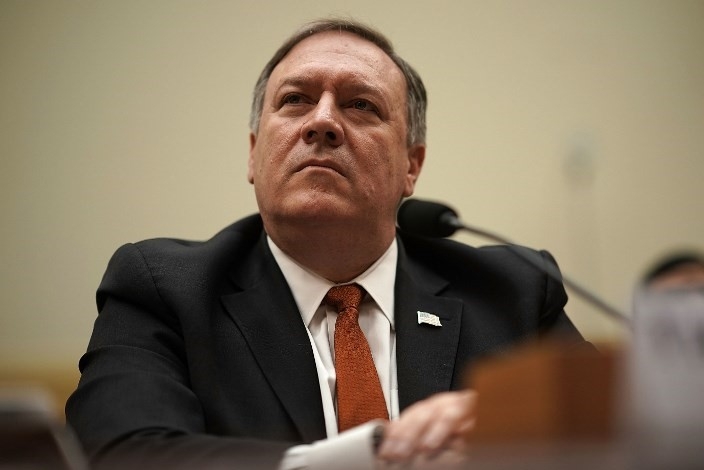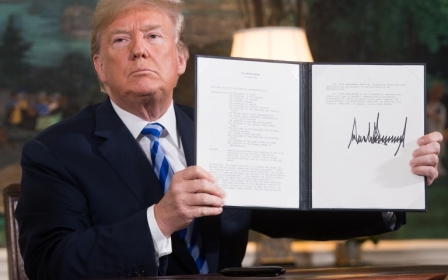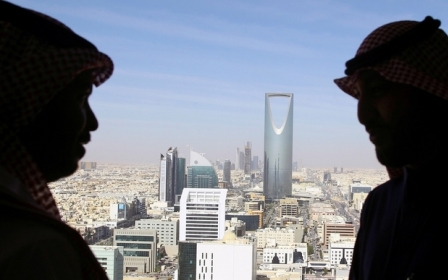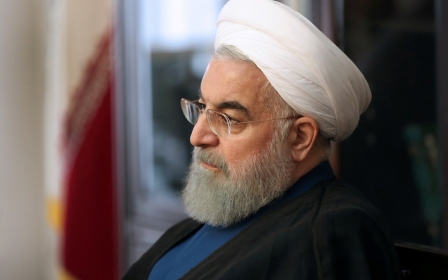What is behind Mike Pompeo's Iran laundry list?

On 21 May, US Secretary of State Mike Pompeo, speaking at the Heritage Foundation, a far-right Washington thinktank, delivered a speech under the banner of "After the Deal: A New Iran Strategy". He laid out a list of 12 "very basic requirements" for Iran. The US would impose the "strongest sanctions in history" if Iran failed to comply with those demands, Pompeo promised.
Among other demands, Pompeo authoritatively stated that "Iran must stop [uranium] enrichment". The case of demanding "zero enrichment" was at the centre of the US-Iran conflict for a decade (from 2003 to 2013) and brought Iran on one side, and the US and Israel on the other, to the brink of war.
However, Iran never bent. It tolerated $185bn in losses as a result of the sanctions until finally, former US President Barack Obama labelled the idea of zero enrichment inside Iran as something that could only materialise in "an ideal world".
Identity change
Iran has accepted strict inspection and monitoring measures that prohibit it from producing high-enriched uranium, at some 90 percent, which is used in nuclear weapons. Five percent is used in nuclear power plants, and at 20 percent it can be used in research reactors or for medical purposes.
Logic dictates that remaining in the deal and accepting excessive restrictions in exchange for naught would not make sense
Of Pompeo's 12 conditions, Iran is almost surely to decline accepting at least eight of them. These include: allow inspectors of the International Atomic Energy Agency (IAEA) access to inspect everywhere, contrary to the nuclear agreement; end its ballistic missile programme; cease its support of Hezbollah, Hamas, and Islamic Jihad; end its support for the Houthi rebels in Yemen; withdraw from Syria and accept disarmament of the Shia militia in Iraq.
Simply put, the Trump administration is asking the Iranian government to change its identity.
In response to Pompeo's speech, Robert Einhorn, a renowned American arms control and non-proliferation expert who played a leading role in the formulation and execution of US policy toward Iran's nuclear programme, told the Wall Street Journal: "It's a pipe dream to believe the administration could achieve its wish list of unrealistically ambitious negotiating objectives."
Challenging the US
Against this backdrop, worthy of note is that the US's European allies not only rejected Trump's move of abandoning the Iran nuclear deal point blank (formally known as the Joint Comprehensive Plan of Action - JCPOA), but also challenged the Americans in a manner unprecedented since the end of the Second World War.
France urged Europe to stand up to Trump over the Iran nuclear deal and not act as "vassals". And the European Union's foreign policy chief, Federica Mogherini, attacked Trump, saying: "It seems that today screaming and shouting, insulting and bullying, systematically destroying and dismantling everything already in place is the mood of our times."
So the question becomes on what basis did the Americans take such a step, which seems almost impossible to succeed?
Following that conversation, the Iranians broke the IAEA seals on the enrichment equipment and have continued enriching uranium to this date even under paralysing sanctions and the threat of war both from the US and Israel. But other calculations may have led White House decision makers to adopt this belligerent position.
Return of sanctions
Iran is under immense economic pressure. A member of the economic committee of the Iranian parliament recently said that prices have risen 30 to 40 percent. The main reason, as economists in Iran maintain, is the Iranian currency (rial) depreciation against the dollar in the last eight months. In this period, the rial has lost 50 percent of its value.
In October 2017, the dollar was exchanged for 42,000 rials, while according to the semi-official ILNA news agency, on 21 May a dollar was exchanged for 58,000 to 62,000 rials on the black market.
If Trump succeeds in destabilising Iran, evidenced by wider protests, both Republicans and the portion of Democrats who wholeheartedly support Israel and shape a significant force in the Congress, could be silenced, thus making impeachment unlikely
Under these conditions, large European corporations, such as the French Total and Airbus, are leaving the Iranian market out of fear of the return of nuclear-related sanctions by 4 November, as well as being banned from doing business in the US if they would maintain their relations with Tehran.
"With the withdrawal of the US from the treaty, the banks are no longer ready to fund Iranian projects for fear of [nuclear-related] sanctions," said the CEO of Italian steel giant Danieli on 17 May, who has a $1.8bn worth contract with Iran. This trend demonstrates that the European governments' relentless efforts to prevent the JCPOA from collapsing does not bear a significant weight in the decision of European CEOs. US threats do, however.
Given this picture, Iranian leadership may at some point bid farewell to the JCPOA. This is underscored by the non-negotiable conditions set by the White House for lifting the sanctions and the increased pressure on Iran's economy as a result of the likely intensification of the US sanctions, as promised by Pompeo.
Iran retaliation?
Logic dictates that remaining in the deal and accepting excessive restrictions in exchange for naught would not make sense. In the first public remarks since US Secretary of State Mike Pompeo demanded that Iran make sweeping policy changes, Iran's Supreme Leader Ayatollah Ali Khamenei on Wednesday set out a series of conditions for European powers if they want Tehran to stay in a nuclear deal after the US exit.
These conditions include: European banks should safeguard trade with the Islamic Republic, continue buying Iranian crude, pledge that they would not seek negotiations on Iran's ballistic missile programme and on its regional activities, both of which were not covered by the nuclear pact but are now being demanded by Washington.
Khamenei warned that if the Europeans did not meet these demands, Iran would resume its enrichment of uranium, shelved under the deal.
In such an eventuality, Iran, in retaliation but also in the hope of forcing the US to retreat from its position - as they did between 2005 and 2013 and finally forced Obama to accept uranium enrichment inside Iran after years of conflict over the issue – would most likely take two actions in parallel.
First, it could expand and upgrade its nuclear programme at an accelerated rate. Second, it could conduct ballistic missile tests to expand the range and power of its missiles. In reaction, Europe would have no choice but to side with the US to halt Iran's advances. This could be what the White House is looking for as the eventual outcome of the process that has already begun.
In response to a reporter who called the White House's new strategy towards Iran "a fantasy … because the Europeans won't go along with [the US] on the sanctions," Pompeo responded by saying that he was "confident that there is a … set of overlapping values and interests" that will eventually "drive us [the US and Europe] to the same conclusion about the need to respond to the Islamic Republic of Iran's threats to the world."
Another significant factor could have played a role in this US incomprehensible move. Robert Mueller's investigation into Russia's interference in the 2016 elections acts as a guillotine blade that can not only decapitate the president, his aides, his entire presidential campaign, but also congressional Republicans.
The White House knows that the probe could lead to impeachment even while Republicans are in control of the Congress. If Trump succeeds in destabilising Iran, evidenced by wider protests, both Republicans and the portion of Democrats who wholeheartedly support Israel and shape a significant force in the Congress, could be silenced, thus making impeachment unlikely.
- Shahir Shahidsaless is an Iranian-Canadian political analyst and freelance journalist writing about Iranian domestic and foreign affairs, the Middle East and the US foreign policy in the region. He is the co-author of Iran and the United States: An Insider’s View on the Failed Past and the Road to Peace. He is a contributor to several websites with focus on the Middle East as well as the Huffington Post. He also regularly writes for BBC Persian. He tweets @SShahisaless.
The views expressed in this article belong to the author and do not necessarily reflect the editorial policy of Middle East Eye.
Photo: US Secretary of State Mike Pompeo testifies during a hearing before the House Foreign Affairs Committee on 23 May 2018 on Capitol Hill in Washington, DC (AFP)
Middle East Eye propose une couverture et une analyse indépendantes et incomparables du Moyen-Orient, de l’Afrique du Nord et d’autres régions du monde. Pour en savoir plus sur la reprise de ce contenu et les frais qui s’appliquent, veuillez remplir ce formulaire [en anglais]. Pour en savoir plus sur MEE, cliquez ici [en anglais].






